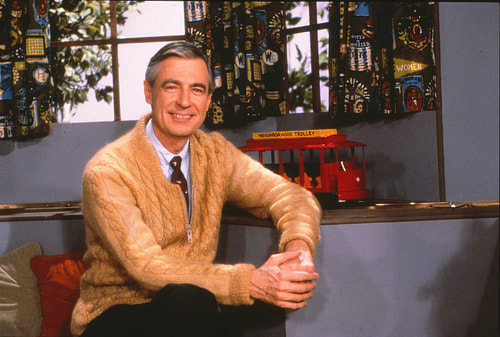Archived Blogs
|
Everyone knows Fred Rogers (aka Mister Rogers).
But after reading about his background and accomplishments, I wanted to know…how did he become the man he was? And then I found a copy of one of his letters listing ten books that influenced him. Here’s the list.
So I decided to check it out. You can read my first blog here. I was a bit taken aback to see a psychology text book listed as the second book. I’d learned about Erik Erickson when I was in medical school. He wrote about developmental stages in children. But he wasn’t the only one. We had several psychologist that outlined important stages of development such as Jean Piaget or BF Skinner. So why him? First, I looked at his stages again. Here are some of his early stages and a very brief description:
So, I took a step back and did a bit of detective work. That’s when I think I figured it out. Fred (I’m tempted to call him Mister Rogers out of respect) was in seminary when he received some advice to take a specific course. A child development course. It was taught by Dr Margaret McFarland. Dr MacFarland was a co-founder of the Arsenal Family and Children’s Center. Other participants included the famous Dr Benjamin Spock and Dr Erik Erickson. So it’s likely he was introduced to Dr Erickson through Dr MacFarland. But here’s the even more interesting part. The whole field of child development was emerging in the middle of the twentieth century and Fred Rogers was right in the epicenter. And why is that a big deal? Prior to this idea of developmental stages, it was not real clear how a person developed into who they were. Maybe you got your red hair from your mom and your temper from your dad? But according to this new literature, going through these stages was a necessary part of our maturation. And if we don’t succeed in mastering a stage, it could have a permanent effect on our lives. Do you know what happened? Fred looked at television designed for children and knew that it needed to be better. He purposefully designed his show around this new information with a goal of helping these children through important stages of development. His show was designed for ages 2.5-5.5 which spanned three of Erickson’s stages. (I would argue that he also provided “consistent, predictable, reliable care in their relationships in order to develop trust” just in case any younger toddlers were watching. Fred had an opportunity to influence (in a positive fashion) millions of children and he took on that responsibility and treated it with the importance that it has. How do I know that? He met with Dr. Margaret McFarland weekly and spoke with her on the phone almost daily—touching on subjects for the show and how to approach them. An article by Sally Ann Flecker discusses their working relationship and the remarkable attention to detail they used on the show. Some of the details that I found interesting: At the start of every show, Mister Rogers enters his house by walking in the door, which is on the left of the viewer’s screen, and moving to the right. This is how children’s eyes will track when they learn to read. The show’s unhurried pace, in marked distinction from most contemporary children’s programs, allows children the chance to process what is being presented, the opportunity to make connections, and the space to concentrate. Mister Rogers often turns to the camera to talk to children—looking right into the television audience for what, to adults, might seem uncomfortably long. For children, though, the eye gaze mimics their earliest interactions with their parents and provides a supportive moment. The trolley serves as a transition. It brings viewers into the show and ferries them from Mister Rogers’ house to the Neighborhood of Make-Believe and back safely to Mister Rogers again. It also gives young children, who are concerned when parents leave, practice with issues of disappearance and reappearance. So, I came to realize that this book was his instruction manual for how to gently guide a child through important developmental stages…crucial for becoming a well-adjusted adult. And then I realized that we all have that duty and with each interaction we have with a child we can either help…or hurt that process. I need to remember that. On to book three. photograph from PBS.org. #thanksmisterrogers
0 Comments
Leave a Reply. |
Archives
October 2020
Categories |
COPYRIGHT 2017 SUSAN BADARACCO | Site Credits


 RSS Feed
RSS Feed